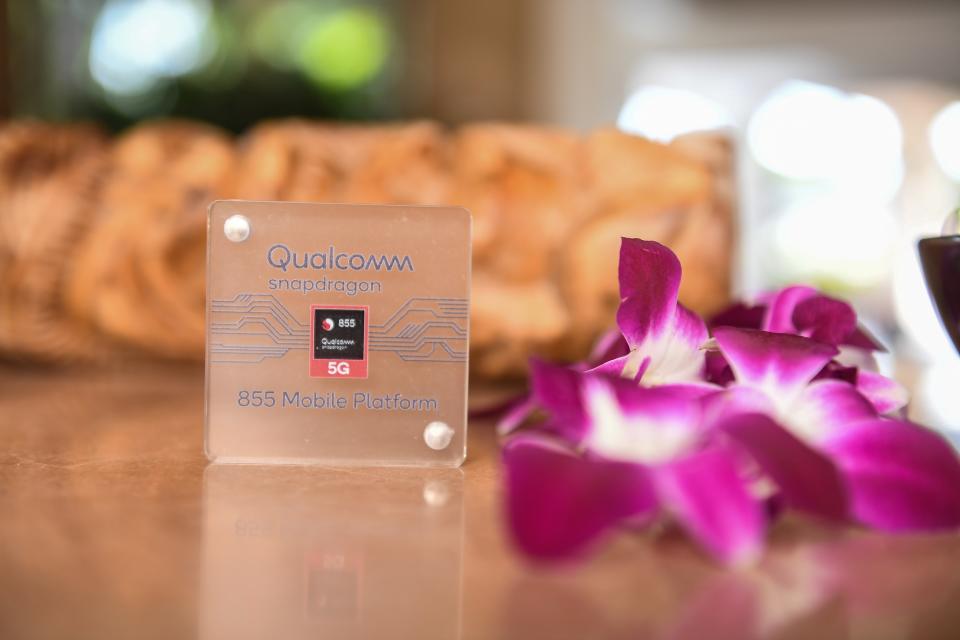Qualcomm Could Help TSMC Make Up for Poor iPhone Sales
For many years, Qualcomm (NASDAQ: QCOM), which is the top manufacturer of applications processors for the Android smartphone market, relied on Taiwan Semiconductor Manufacturing Company (NYSE: TSM) to manufacture its highest-end Snapdragon mobile applications processors. In recent years, though, Qualcomm has moved away from TSMC for the manufacture of such premium chips and relies on TSMC rival Samsung (NASDAQOTH: SSNLF) instead. The Snapdragon 820/821, Snapdragon 835, and Snapdragon 845 are all manufactured using Samsung's technologies.
However, as had been rumored for quite some time, Qualcomm looks set to utilize TSMC's latest 7-nanometer (nm) chip manufacturing technology to build its upcoming Snapdragon 855 chip. According to DigiTimes, production of that chip "will soon kick off," and the chip will formally launch in the second quarter of 2019.

Image source: Qualcomm.
As you might be aware, Apple's (NASDAQ: AAPL) A12 Bionic chip, which debuted back in September as part of the company's newest iPhones, is manufactured using TSMC's 7nm technology. Unfortunately for both Apple and TSMC, sales of the latest iPhones are falling short, leaving TSMC's 7nm factories underutilized.
Per DigiTimes' sources, "TSMC is expected to see orders placed for Qualcomm's 7nm chips offset weakness for the iPhone chips."
Let's take a closer look at how those Qualcomm chip orders could help boost TSMC's smartphone business.
Dominating premium smartphones
Many premium Android smartphones are powered by Qualcomm's highest-end Snapdragon 800-series applications processors. Not all of them are -- Samsung, for example, uses its own applications processors in its iPhone competitors in certain regions, and Huawei builds its own chips for its premium devices -- but Qualcomm's share of the premium Android applications processor market is large, and among merchant vendors, it runs practically unopposed. (MediaTek, Qualcomm's main merchant mobile processor rival, has had little success in the premium portion of the market.)
What this means for a company like TSMC, then, is that winning the chip manufacturing orders for Qualcomm's highest-end mobile applications processors should give TSMC significantly more exposure to the premium smartphone market than it had previously. This should translate into more revenue and profit.
In fact, this situation seems incredible for TSMC: It's already the exclusive manufacturer of Apple's iPhone applications processors, and it's also the only maker of Chinese smartphone vendor Huawei's premium smartphone chips. With Qualcomm in the mix as well, TSMC has apparently locked up the entirety of the premium smartphone processor market (save for the portion of Samsung's devices that use the South Korean giant's homegrown chips) with its 7nm technology.
The good times might not last
It's clear that with its 7nm technology, TSMC has hit a home run -- it's ahead of the competition with this technology (no other chip manufacturer has put a 7nm-class technology into mass production yet), which has led not only to core customers sticking around, but to a major one coming back.
That, unfortunately, might not last. Back on Feb. 21, 2018, Qualcomm and Samsung announced that Samsung would build "future Qualcomm Snapdragon 5G mobile chipsets using Samsung's 7-nanometer (nm) LPP (Low Power Plus) EUV process technology."
It's not clear if this announcement meant that the manufacturing relationship would be an exclusive one, but unless something changes, it doesn't look like TSMC will have a monopoly on Qualcomm's highest-end chip orders once Samsung's 7nm LPP technology is in mass production.
Nevertheless, in the here and now, TSMC has sewn up the premium mobile applications processor market with its 7nm technology, and the company's share gains across 2019 should help soften the financial blow from Apple's struggles.
More From The Motley Fool
Ashraf Eassa owns shares of Qualcomm. The Motley Fool owns shares of and recommends Apple. The Motley Fool owns shares of Qualcomm and has the following options: long January 2020 $150 calls on Apple and short January 2020 $155 calls on Apple. The Motley Fool has a disclosure policy.

 Yahoo Finance
Yahoo Finance 